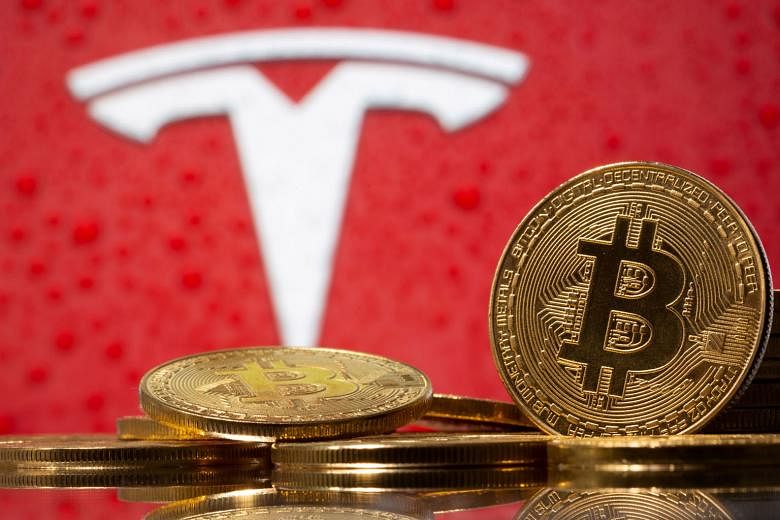Tesla has suspended the use of bitcoin to purchase its vehicles because of climate concerns, chief executive Elon Musk said in a tweet on Wednesday, reversing the company's stance in the face of an outcry from some environmentalists and investors.
Bitcoin, the world's biggest digital currency, dropped as much as 15 per cent after the tweet, sinking to as low as US$46,045 in Asian trading before paring some of the drop. It was down about 11 per cent at US$50,330 around 5pm in Singapore yesterday.
There were reports earlier of outages at digital-token exchanges as people rushed to sell.
Other cryptocurrencies, including ethereum, also fell before regaining some ground in Asia trade.
In Asia, Monex Group, whose ownership of crypto exchange Coincheck made it the second-best performing stock in Japan this year, dropped as much as 12 per cent.
Nexon, which just last month became the first Japanese firm to make a significant bet with a US$100 million (S$134 million) purchase of the cryptocurrency, fell as much as 17 per cent, the most in a year, though a poor growth outlook given at its earnings was also weighing on sentiment.
Mr Musk said in his post that Tesla would not be selling any bitcoin and aimed to use it for transactions once mining shifted to a more sustainable energy.
"We believe it has a promising future", Mr Musk wrote. "But this cannot come at great cost to the environment." He added: "We are also looking at other cryptocurrencies that use 1 per cent of bitcoin's energy/transaction."
His post took many in the cryptocurrency community by surprise, including Mr Nic Carter, a partner at Castle Investment Management and a leading voice among defenders of bitcoin's energy use.
"Surely he would have done his diligence prior to accepting bitcoin?" said Mr Carter. "Very odd and confusing to see this quick reversal."
Tesla's addition of bitcoin to its balance sheet was the most visible catalyst during this year's rally in the digital currency.
Bitcoin jumped 16 per cent on the day in February when Tesla revealed it had bought US$1.5 billion of bitcoin and would soon accept it as payment for cars.
The digital currency is created when high-powered computers compete against other machines to solve complex mathematical puzzles, an energy-intensive process that currently often relies on electricity generated with fossil fuels, particularly coal.
At current rates, such bitcoin mining devours about the same amount of energy annually as the Netherlands did in 2019, the latest available data from the University of Cambridge and the International Energy Agency shows.
Some investors cast doubt on Tesla's plans months ago.
"We are, of course, very concerned about the level of carbon dioxide emissions generated from bitcoin mining," said Mr Ben Dear, chief executive of Osmosis Investment Management, a sustainable investor managing about US$2.2 billion in assets that holds Tesla stock in several portfolios.
CHINA DOMINANCE The dominance of Chinese bitcoin miners and lack of motivation to swop cheap fossil fuels for more expensive renewables could mean there are few quick fixes to the cryptocurrency's emissions problem.
Chinese miners account for about 70 per cent of bitcoin production, data from the University of Cambridge's Centre for Alternative Finance shows.
They tend to use renewable energy, mostly hydropower, during the rainy summer months, but fossil fuels, primarily coal, for the rest of the year.
Officials in Beijing are conducting a check on data centres involved in cryptocurrency mining to better understand their impact on energy consumption, sources told Reuters last month.
In theory, blockchain analysis firms said, it is possible to track the source of bitcoin, raising the possibility that a premium could be charged for green bitcoin.
Stronger climate change policies by governments around the world might also help.
Some bitcoin proponents note that the existing financial system - with its millions of employees and computers in air-conditioned offices - uses large amounts of energy too.
REUTERS, BLOOMBERG


